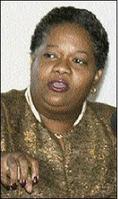
Olivia 'Babsy' Grange is the minister of information, culture, youth and sports; she also has responsibility for gender affairs. The prime minister, when he comes to write his memoirs, will perhaps explain to his 'mendicant' colleague heads of government within CARICOM how, having placed as many as five portfolio responsibilities in one pair of hands, he still contrived to construct the largest Cabinet ever in Jamaica.
In recent times, Grange has been fully occupied with the Olympics and our Olympians, to the extent that at least one commentator has wondered aloud whether she herself might have been a competitor at the Bird's Nest.
Be that as it may, it was clearly right that, with her responsibility for sports, she was entitled and obliged to see to the well-being of our athletes in Beijing and to have appropriate welcome ceremonies upon their return to Jamaica.
But she also has other responsibilities. Jamaica's children and youth are under siege. They are being raped, carnally abused, abducted, murdered and subjected to incestuous maladies. During this year alone, scores have suffered from these attacks and hundreds are missing, perhaps having fallen prey to the dread trafficking in persons.
Word from the government

Sharon Hay-Webster
For a long time, we did not hear much from the Government concerning that troubling situation. Grange, however, last week finally managed to bestir herself in this regard and issued a statement to the media that " ... the abuses that are taking place in the country - incest, carnal abuse, rape, abduction and killings - are becoming all too frequent".
She further exhorted: "We must commit ourselves to take a concerted stand for the elimination of all forms of violence, but especially against our children." That is an urgent call; but the minister has had, and still has, a real opportunity to put a meaningful dent into this sickening criminal enterprise.
How so? In opposition, Grange was an eager member of a joint select committee of Parliament, established to consider and report on two bills: 'An Act to Amend the Offences Against the Person Act' and 'An Act to Amend the Incest (Punishment) Act'.
That committee began its deliberations on December 6, 2006, and held a total of 16 meetings, the last of which took place on June 6, 2007. The report and recommendations which flowed from the deliberations were tabled on June 8, 2007, in the Senate and on July 3, 2007, in the House of Representatives. The imminent general election prevented any debate on the report.
The minister now calls for a concerted stand" to be taken with respect to several of the very matters that were the subject of the discussions in the select committee, but her government has maintained a pregnant silence concerning the recommendations contained in its report.
The leader of the Opposition, Portia Simpson Miller, on July 8, tabled a motion in the House of Representatives, insisting that "whereas sexual assaults (including deadly attacks) and the societal stain of incestuous relationships are acknowledged to be rife in our country ... be it resolved that this honourable House urge that arrangements be put in place, with the utmost speed, for debate to take place on the report (of the select committee) which contains a wide-ranging set of recommendations".
By so doing, the leader of the opposition was seeking to accelerate the process so that the relevant bill could be tabled and passed by Parliament to strengthen the hand of the security forces and the stakeholder agencies. Grange and her colleagues in the Government have, so far, remained unmoved.
Sex Offenders' Registry

Olivia 'Babsy' Grange
A similar motion had been tabled in the Senate late last year, but was withdrawn when Dorothy Lightbourne, the leader of government business (who had herself been a member of the select committee) advised the Senate that further developments would come about only after a sex offenders' registry had been put in place.
Curiously, the select committee's report addressed that very issue in the following terms:
"Sex Offenders' Registry: Many of the organisations that made submissions to your committee recommended the establishment of a sex offenders' registry as a means of monitoring sex offenders. This recommendation found favour with your committee. Committee members Hay-Webster and Grange advocated strongly for the development and implementation of such a registry. It was recognised, however, that the ramifications of the initiative required careful consideration, and that the settlement of all the relevant policy issues would require the participation of the various stakeholders. It was decided, therefore, that the enactment of legislation to establish such a registry would be undertaken as a separate exercise so as not to delay the process."
The deliberations of the select committee had been blessed by an unusual amount of interest and participation by a wide range of individuals and institutions. The focus was not confined to the provisions of the bills, but took account of our social realities, while considering relevant legislation from other jurisdictions.
Valuable insights

Dorothy Lightbourne
Some 25 organisations and individuals contributed valuable insights into the practical situations with which the bills were concerned and it was encouraging to witness the rare and fulsome participation of the media fraternity in the entire exercise. They did not only produce quality reports on the proceedings, but sent representatives to be part of the deliberations which, they acknowledged, sought to address deep moral and cultural issues in our country.
Because of the enterprising approach adopted by the media fraternity, active interest was displayed by the public at large in the matters being considered by the committee. Interviews were conducted by several media houses to encourage participation and an understanding of the issues which touch and concern the protection and welfare of vulnerable individuals in our society.
The participants included members of the legal fraternity and the Church in Jamaica and Trinidad and Tobago, organisations concerned with the development of women, children and persons with disabilities, the Planning Institute of Jamaica and several other departments of government, the University of the West Indies, the Lay Magistrates' Association, and a composed individual who had herself been sexually abused.
The committee recommended that the existing definition of rape should be retained (that is, rape should continue to be an offence committed by a man against a woman), and that the other penetrative acts covered in the definition of "sexual intercourse" should be treated as grievous sexual assaults which would attract penalties similar to rape.
It made recommendations relating to such matters as, spousal abuse, the admissibility of evidence in these types of cases, protection of the rights of victims, restriction of evidence of previous sexual history of the victim, a public-education programme, and the treatment and rehabilitation of offenders.
Grange and her colleague ministers should have already noted that the Jamaica Labour Party Manifesto 2007 contains certain 'pledges' relating to "protecting our children".
Manifesto pledge
In relation to safeguarding children's rights, there was the manifesto pledge to: "Amend the Offences Against the Person Act to provide severe penalties for carnal abuse of girls between the ages of 12 and 16 which now constitutes a mere misdemeanour".
The select committee had already recommended that the age distinction should be removed, that is, there should be one offence against persons under 16 years, and that the age of the victim should be treated as a factor to be taken into account at the sentencing stage.
There was also the pledge in the manifesto to provide stiffer penalties for the offence of incest. The select committee's recommendations had gone much further, to create three distinct categories:
Incest, which should continue to apply to sexual intercourse between persons who are closely related by blood. Sexual activity between an adult and a minor to whom the adult stands in loco parentis.
Sexual activity between an adult and a minor or dependent to whom the adult stands in a position of trust.The two latter categories would cover, for example, stepchild/stepparent, adopted child/adopted parent, student/teacher/sports coach, young person/pastor, persons who transport minors, and other relationships that involve young persons and adults exercising care and supervision over them.
Grange maintains that abductions and killings are becoming all too frequent, but nothing has been done by her administration since the committee's recommendations concerning these grave offences. The committee considered matters relating to the abduction of persons under 16; procuring the defilement of persons by threats of fraud; abduction of persons under 18 with intent to have sexual intercourse; allowing persons under 16 to be in brothels, and more.
After extensive discussions and consultation with the director of public prosecutions, the committee suggested that the provisions of the Offences Against the Person Act should be examined to determine which offences had been overtaken by the Trafficking in Persons Act, and which offences should be retained.
Valuable recommendations
So that, while Minister Grange and the administration continue to fiddle, the prospects of so many of our children have remained in peril. Left to them, the valuable recommendations of that joint select committee would have simply been allowed to disappear from the radar while the minister proceeds to seek our commitment to take a "concerted stand" against the abuse that is being perpetrated against our children.
The leader of the opposition has long urged the Parliament to "signal its commitment to a full consideration of the contributions made by the 25 local and regional organisations and individuals whose participation served to generate a great deal of public interest in the deliberations of the joint select committee on issues which touch and concern deviant behaviour of the kind that challenges the very soul of the nation".
Certainly, if Minister Grange had pursued those recommendations from September of last year, she would have earned a silver medal to celebrate with the Olympians. That silver medal would have come in the form of an Act of Parliament entitled: The Sexual Offences Act which, with her support, her colleague member, Hay-Webster, had recommended, and was accepted by the select committee.
The gold medal would, of course, come in time, with the meaningful implementation of the provisions of that act to the benefit of our people, in particular, our children, our youth and our women.
In this, then, one of the races against the predators, no medal for Minister Grange! The minister and the administration have yet to get to the starting blocks.

